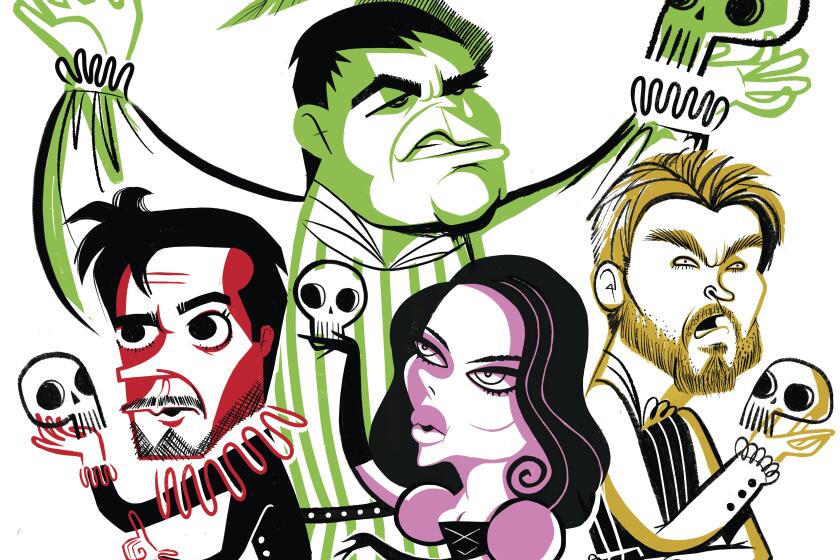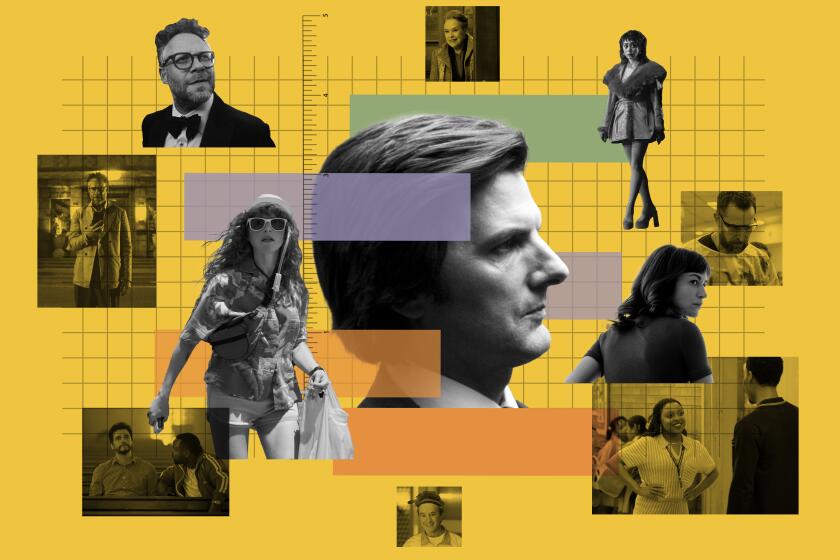Superhero shows are deeper than ever. Will the Emmys notice?
- Share via
These are not your parents’ superhero shows.
Some comic-based TV fare stands among today’s most critically acclaimed series, whether holding a funhouse mirror up to reality in “The Boys,” dazzling with cinematic technique to explore a mind shattered by grief in “WandaVision” or dropping the gloves to take on real-world issues in “The Falcon and the Winter Soldier.” These shows have the highest of production values, the broadest of reach and the most serious of aims — they’re cinematic, conveying emotional, psychological experiences.
Martin Scorsese said superhero movies in the Marvel Cinematic Universe don’t convey emotional, psychological experiences. Not everyone agrees.
“I’m glad genre is starting to get a little bit of respect, although let’s be honest, it’s always going to be an uphill climb for us,” said “The Boys” showrunner Eric Kripke, whose series might score with Emmy voters who honored “Watchmen” last year — both are deconstructions of superhero mythos. “Any good genre, going back to ‘The Twilight Zone,’ has a very human, oft times subversive story to tell and it’s just cloaked in metaphor.”
The perception of the genre’s limitations is well-earned; Kripke notes the start of comics in the 1940s, with its simplistic good-versus-evil worldview. Emmy voters of a certain age could have a tough time shaking the “Pow-Biff-Zokk” camp of the 1960s “Batman.” But current superhero TV isn’t just about how Mr. Freeze wants to put Gotham on ice.
“If you were to ask me,” says Kripke, “I would say ‘The Boys’ is a dark comedy about late-stage capitalism.”
He’s not kidding. While the Amazon Original show’s logline could be “What if the Justice League were ... not nice,” its themes of the corrupting nature of power and oligarchists not being your friends are not exactly veiled amid its corporately sponsored, impure-of-heart heroes — even as a uniquely preserved Nazi sneaks into the hero fold.
“We usually start with depth of character and psychological truth,” says Kripke of the show’s writing process, “then political or societal commentary and then we go to shocking, bananas moments. I think those end up being what’s on the front of our cereal box and that’s fine. I love them as much as anyone. And if that’s going to make people buy our cereal, hopefully they’ll be surprised by the amount of fiber inside.”
“WandaVision” came on the scene dressed as beloved sitcoms from decades past, later revealed to be layers of protagonist Wanda Maximoff’s (Elizabeth Olsen) fractured psyche. But beneath the bells and whistles, the heartbeat was an examination of coping with loss — the death of Wanda’s love, Vision (Paul Bettany).
“The grief journey was the tethering force,” showrunner Jac Schaeffer says. “I aligned each episode to the stages of grief, so the story is told nonlinearly but the grief story is linear. We start in her denial and move all the way to acceptance.”
The notion of soothing trauma by escaping into comfort television proved unexpectedly timely to audiences. To Schaeffer, it’s another example of how comic-based media has proved relevant.
“We were using the superhero space to explore mental health, conflict resolution, self-acceptance. So many superhero stories right now deal with things like PTSD and crisis of identity,” she said.
“The terrain of our current mythology has to do with emotion and psychology. Something that Marvel is doing well is an examination of all the different motivations in a given conflict as opposed to good versus bad. We all, as consumers, have grown up a bit and know the world is far messier than that.”
That said, the cinematic bells and whistles of Disney+’s “WandaVision,” from its period-nailing production design and costumes to its versatile cinematography, editing, music and songs, are strategically deployed.
“Every episode is designed to include these moments where the sitcom reality breaks or is challenged, and those are always the most revealing moments in terms of what’s going on, bigger picture, for Wanda,” director Matt Shakman said. “We refer to them as ‘Get Out’ or ‘Twilight Zone’ moments. In the opening episode, it’s the dinner table scene: When challenged, Wanda and Vision can’t provide any information about their past; all of a sudden, you’ve completely changed from a proscenium [view] to a subjective psychological experience.”
“The Falcon and the Winter Soldier” generally takes a direct approach to addressing real-world issues, though there are metaphors. One of the key supporting characters, Isaiah Bradley (Carl Lumbly), a Black super-soldier from the 1940s, is the product of deadly government experimentation on Black men — an echo of the horrific Tuskegee syphilis study.
The ostensible villain of the series, the activist group “The Flag Smashers,” resists the forced relocation of people who are living in areas that are suddenly being reclaimed (an unintended consequence of the heroes’ triumph in “Avengers: Endgame” that restored to life billions of people “snapped” out of existence for years).
But, says showrunner Malcolm Spellman, “Is anyone really the villain in the show, except for the issues they’re confronting? The Flag Smashers start in a way most people would probably support. If there’s meds [available] and there’s people who aren’t getting them, isn’t it OK to get those to them? They’re community activists, supercharged.
“These are not the heroes of the past. Whether they’re less virtuous, more directly involved with the same struggles you’ve gone through ... these are future-forward heroes.”
The show doesn’t shy from its themes of PTSD and the complications of being Black in America. Bucky (Sebastian Stan) is haunted by the consequences of his decades as the mind-controlled assassin, the Winter Soldier. Sam (Anthony Mackie) is a world-famous Avenger who can’t get a bank loan. He is racially profiled by cops. He has been asked by dear friend Steve Rogers to succeed him as Captain America, but Sam isn’t sure America is ready for a Black Captain (in interviews, Mackie has called the relationship of Black men and America an “abusive” one).
“We were going to be discussing through entertainment what it is for a Black man to pick up the shield, an iconically white symbol,” says series director Kari Skogland. “From the beginning, the idea of the show was it was very grounded. [The film] ‘Endgame’ was a different kind of spectacle; it was otherworldly. This was bringing this whole conversation right to the fore, to the real world, talking about imperialism, elitism, the racial discussion.”
One of the intended consequences? Kids in real life seeing a Black Captain America.
“You talk in metaphors, it’s easier to ingest,” Skogland said. “It’s vitamins in the ice cream.”
More to Read
Sign up for The Envelope
Get exclusive awards season news, in-depth interviews and columnist Glenn Whipp’s must-read analysis straight to your inbox.
You may occasionally receive promotional content from the Los Angeles Times.












